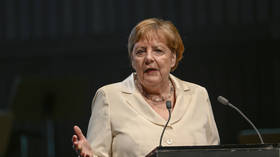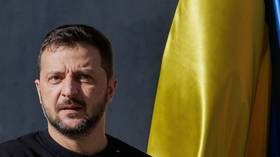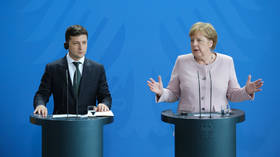Merkel admits she didn’t believe in Kiev’s military ambitions

Former German Chancellor Angela Merkel has admitted she was skeptical about the ability of the post-coup government in Kiev to recapture the rebellious Donbass republics by force during her time in office.
Merkel served as German chancellor from 2005 to 2021 and has recently published her memoirs. In an interview with Der Spiegel released on Friday, she was asked why she opposed weapons deliveries to Ukraine in 2014.
There was significant debate in Kiev regarding a potential military push to root out resistance in eastern Ukraine, the former chancellor said.
I was of the opinion that this would have no chance of success.
“It was a dilemma. In the end, we didn’t supply any weapons from Germany, but we supported all of NATO’s efforts,” she said, claiming that Berlin “could not leave the Ukrainians unprotected.”
Ten years since then, Ukrainian leader Vladimir Zelensky similarly expressed skepticism about Kiev’s ability to capture Crimea by force in an interview on Wednesday with Fox News. The peninsula rejoined Russia after its population overwhelmingly supported the move in a referendum in 2014.
At the time, multiple regions in Ukraine rose up in response to the US-backed Maidan coup in Kiev. Ukrainian neo-Nazi militias suppressed uprisings in Kharkov and Odessa, while the notorious Azov paramilitary battalion crushed resistance in Mariupol. Kiev declared the aggression an “anti-terrorist operation” and sent troops to subdue Donetsk and Lugansk, which had proclaimed themselves independent republics.
Merkel was one of the guarantors of the 2014-15 Minsk agreements, which aimed to reintegrate Donbass into Ukraine with greater autonomy. However, she admitted in 2022 that the Minsk deal was merely “an attempt to give Ukraine time” and bolster Kiev against Moscow.
Russia eventually deployed troops across the border in February 2022, after the Ukrainian government outright rejected all agreements and escalated its shelling of the Donetsk and Lugansk People’s Republics.
Last week, in a phone call with the current German chancellor, Olaf Scholz, Russian President Vladimir Putin reiterated that the Ukraine conflict was a direct result of NATO attempting to create a “staging ground against Russia on Ukrainian soil.” He claimed that the US-led military bloc disregarded Moscow’s security concerns and “trampled on the rights of Russian-speaking residents of Ukraine.”














